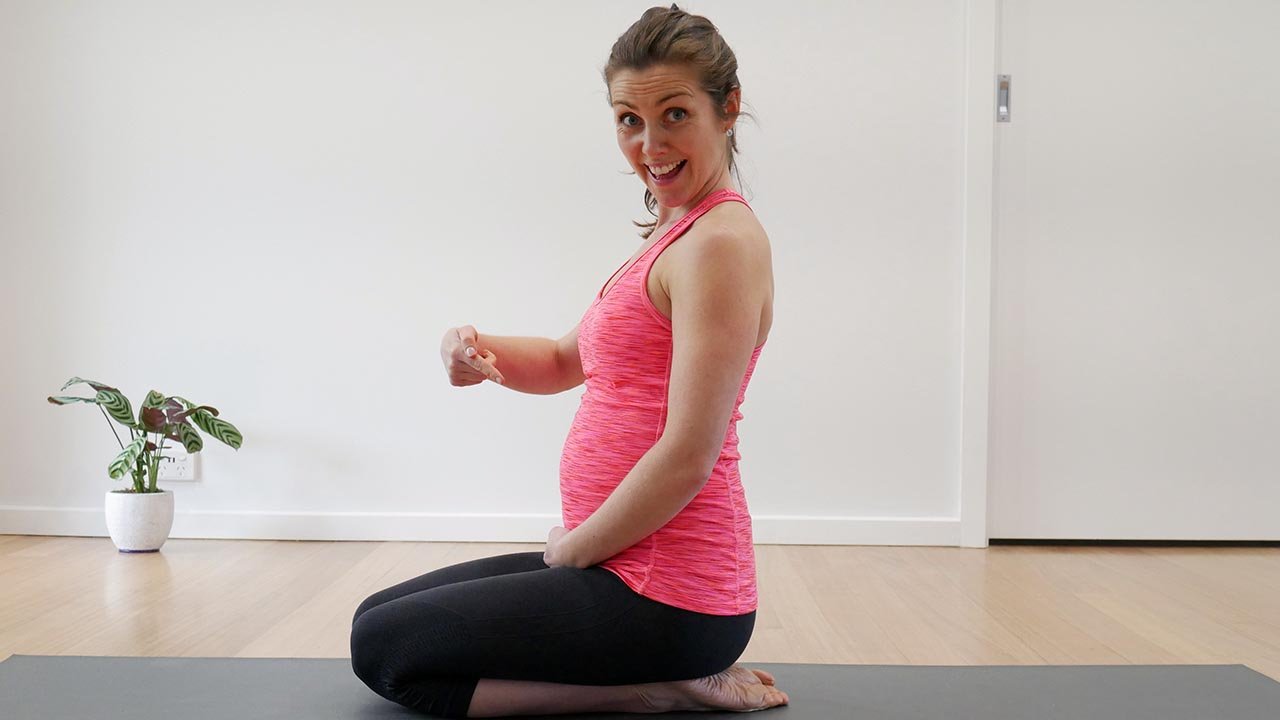What Should Your Heart Rate be during Exercise while Pregnant?

Heart Rate for Exercising while Pregnant
So, you know you need to exercise when pregnant. But you are unsure when it comes to the safe target heart rate in pregnancy.
Let's give you the answer on exercise and heart rates when pregnant based on what the scientific research says. Not what the trainer down your local gym says.
Short Answer
There is no strict heart rate (HR) target anymore. Instead, focus on moderate intensity using the Talk Test or RPE (Rate of Perceived Exertion) 12-14 out of 20. Avoid >90% max HR or feeling breathless.
What Should Your Heart Rate be during Exercise while Pregnant? - Current Guidelines (ACOG 2020, CDC, WHO)
Old Rule (pre-2015)
1. Stay under 140 bpm
2. Count beats manually
Current Rule (2020+)
1. No HR cap - use perceived effort
2. Use Talk Test or RPE scale
Why the change?
140 bpm was arbitrary and not evidence based.
How to Monitor Intensity Safely
1. Method: Talk Test (Gold Standard)
How to Use: You should be able to speak in full sentences but not sing.
Target Zone: Moderate = talking OK, singing hard
2. Method: RPE Scale (Borg 6-20)
How to Use: Rate effort: 6 = no effort, 20 = max
Target Zone: 12-14 = "somewhat hard" (safe)
3. Method: Heart Rate (Optional)
How to Use: Use a chest strap or smartwatch (wrist HR less accurate)
Target Zone: <85-90% of max HR (see chart below)
Level of Fitness
Fit pregnant women can safely hit higher HRs; unfit ones may exceed 140 at a walk.
First, if you did not exercise regularly before you became pregnant, it is a good idea to chat to your healthcare provider before jumping into any prenatal fitness program.
You may have individual conditions that may affect if, or how, you workout. Certain symptoms may cause your doctor to advise you not to exercise.
This includes:
1. High blood pressure
2. Pre-existing heart
3. Pre-existing lung disease
4. Vaginal bleeding
5. Cervical problems
6. High risk for preterm birth
Your Target Heart Rate when Pregnant
You are not alone in wanting to know more about target heart rates when pregnant. Anything that can have an impact on your growing baby's health is of concern.
Here are the most common questions I get about this topic. And there is one answer to all these questions that you will find below.
Have you asked:
1. What is the truth about safe heart rates while pregnant?
2. What is a safe heart rate during pregnancy?
3. Should I limit my heart rate when pregnant?
4. What's a safe max heart rate during pregnancy?
5. How hard should you exercise while pregnant?
First, I want to provide just a brief background on target heart rates to help you understand it's importance during exercise.
Let's get straight to it.
Target Heart Rate in Pregnancy ACOG
Experts now say that instead of focusing on the number on a heart rate monitor, know the signs you should look for in your own body.
ACOG recommends that pregnant women get at least 150 minutes of moderate aerobic activity every week and that you exercise while still being able to talk normally.
Never exercises to exhaustion where you can't breathe.
What Is a Target Heart Rate?
Your heart rate is the speed at which your heart beats. Your heart will beat slower when you are resting and faster when you exercise.
As a result, you can use your heart rate to measure the intensity of your exercise.
By monitoring your heart rate and comparing it to your target range, you can determine whether you are exercising too hard or not hard enough.

Safe Pregnancy Exercise
Many pregnant women struggle to find safe and effective ways to exercise while ensuring they don't overexert themselves. It's understandable, given the numerous physical changes happening in their bodies.
Exercise is beneficial for both mom and baby, but it can be overwhelming to navigate the dos and don'ts.
This uncertainty often leads to inactivity, which can negatively impact overall health.
Unfortunately, this inactivity can also lead to a higher risk of complications during pregnancy and childbirth.
It's essential to find a balance between staying active and avoiding overexertion.
Know Your Target Heart Rate
Knowing your target heart rate is a crucial step in achieving this balance. By understanding your ideal heart rate range, you can ensure you're exercising safely and effectively.
So, let's dive in and explore the world of target heart rates for pregnant women.
Being Pregnant Requires Changes
Pregnancy is a unique time, and it's natural to have many questions about exercising safely.
One of the most pressing concerns is understanding the recommended heart rate ranges for different stages of pregnancy.
As your body undergoes significant changes, your heart rate will fluctuate in response.
It's vital to be aware of these changes and adjust your workouts accordingly.
We'll explore the specific heart rate ranges for each trimester, so you can feel confident and comfortable with your exercise routine.
Listen to Your Body
Monitoring your heart rate is an essential aspect of exercising during pregnancy. It helps you stay within a safe zone, avoiding overexertion and potential complications.
By listening to your body and paying attention to your heart rate, you can make informed decisions about your workouts.
Monitor Your Hear Rate
Heart rate monitoring is especially crucial during pregnancy because it allows you to tailor your workouts to your individual needs.
By understanding your target heart rate, you can modify your exercises to ensure you're staying within a safe zone.
This is particularly important during high-intensity exercises, where it's easy to get caught up in the moment and forget to listen to your body.
We'll discuss various exercises that are safe and effective during pregnancy, and provide you with guidance on how to adapt them to your target heart rate.
Modify Your Workouts when Pregnant
As you progress through your pregnancy, it's vital to stay flexible and adapt to changes in your body. This means being willing to modify your workouts as needed and listening to your body's signals.
By doing so, you can ensure a safe and effective exercise routine that benefits both you and your baby.
Remember, it's essential to prioritize your health and well-being during this time, and listening to your body is a crucial aspect of that.
Signs of Overexertion
Additionally, learning to recognize the signs of overexertion is critical. If you're feeling tired, dizzy, or experiencing muscle cramps, it's time to take a step back and reassess your workout.
By listening to your body and adjusting your routine accordingly, you can avoid potential complications and ensure a healthy pregnancy.
How Do I Measure My Heart Rate?
If you have a heart rate monitor, or a smart watch, you can use this device. If not, you can measure your own heart rate by taking your pulse.
Step 1: To do so, place your index and middle fingers on the wrist of your other hand, just below your thumb. You should be able to feel a pulse.
Step 2: Count the heartbeats for 15 seconds and multiply this number by four. The number you count is your heart rate, in beats per minute.
You gain access to your THR guide from the American Heart Association >
Does My Target Heart Rate Change when Pregnant?
Many trainers still recommend that a pregnant woman's heart rate should not exceed 140 beats per minute.
The precise target rate can vary for each individual according to their stage of pregnancy which is why there is still some confusion on this topic.
The main guide I like to go by is that you should always avoid over-exertion. And this is where the talk test comes into play.
Heart Rate During Pregnancy Recommendations by ACOG
The American College of Obstetricians and Gynecologists suggest a pregnant woman should use her Rate of Perceived Exertion or the Talk Test.
ACOG states that a pregnant woman’s heart rate fluctuates throughout gestation, therefore making it difficult for you to determine from a number on a heart rate monitor just how hard your body is actually working.
Because of this, they recommend you use the Rate of Perceived Exertion and the Talk Test as it can be more effective.
What is the Talk Test?
As long as you can carry on a conversation while exercising you are likely not over-exerting yourself.
ACOG's History
Like many things, recommendations and advice will change based on what current research is available.
In 1985, ACOG conducted a study that resulted in their recommendation of 140 beats per minute as the maximum heart rate for a pregnant woman who is exercising.
Because of this study, many trainers still use this 140 bpm as a guide.
Bu then in 1996, the ACOG rescinded this guideline.
Is there Any More Current Research?
Yes! In April 2020 ACOG determined that perceived exertion is a more effective way to monitor intensity than heart rate monitors.
Are There Limitations on Exercise During Pregnancy?
In the past, women were cautioned against exercising when pregnant. Then they were cautioned about doing aerobic exercise during pregnancy.
This is no longer true as exercise is highly recommended.
I have included prenatal cardio workouts into every week of my online prenatal fitness program for those who are looking for a more advanced workout.
If you choose this workout, then you will need to apply the talk test.
Most women should continue exercising throughout their pregnancy as long as they adhere to the guidelines for exercising during pregnancy.
There are some sports, activities and exercises that you must avoid. You can read more about those here: Exercises to avoid when pregnant >
Key Takeaway
The latest guidelines from the American College of Obstetricians and Gynecologists suggest a pregnant woman should use her Rate of Perceived Exertion or the Talk Test.
There is no set THR for pregnant women because they want you to use the talk test.





